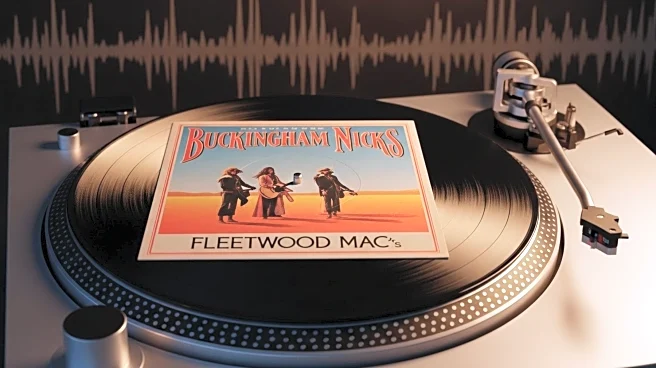What's Happening?
In 1973, musicians Stevie Nicks and Lindsey Buckingham released an album titled 'Buckingham Nicks' that played a pivotal role in their careers. This album caught the attention of Mick Fleetwood, leading to their invitation to join Fleetwood Mac, a move that significantly shaped the band's future sound. Recently, this influential album has been remastered, offering a fresh perspective on the early work of Nicks and Buckingham. The remastering of 'Buckingham Nicks' provides listeners with a clearer and more refined version of the original recordings, highlighting the duo's musical talents and the foundational elements that would later define Fleetwood Mac's iconic sound.
Why It's Important?
The remastering of 'Buckingham Nicks' is significant as it revisits a crucial moment in rock history, where the collaboration between Nicks, Buckingham, and Fleetwood Mac began. This album not only marked the beginning of a new era for Fleetwood Mac but also set the stage for the band's future success, including the release of their critically acclaimed album 'Rumours'. For fans and music historians, the remastered album offers a deeper understanding of the band's evolution and the early contributions of Nicks and Buckingham. It also serves as a reminder of the transformative power of music collaborations and the lasting impact they can have on the industry.
What's Next?
With the release of the remastered 'Buckingham Nicks', there may be renewed interest in Fleetwood Mac's discography and the individual careers of Stevie Nicks and Lindsey Buckingham. This could lead to increased sales and streaming of their music, as well as potential new projects or collaborations. Additionally, the remastering might inspire other artists to revisit and re-release their early works, providing fans with enhanced listening experiences and preserving musical legacies for future generations.
Beyond the Headlines
The remastering of 'Buckingham Nicks' also highlights the ongoing trend of revisiting and revitalizing classic albums in the music industry. This practice not only preserves the cultural heritage of influential music but also introduces it to new audiences. It raises questions about the preservation of artistic intent versus modern technological enhancements, and how these remastered works are received by both original fans and new listeners.










